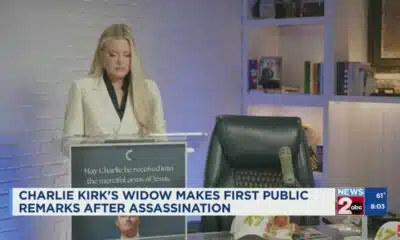News from the South - Missouri News Feed
Plan to shift from income tax to sales tax advances to Missouri Senate
Plan to shift from income tax to sales tax advances to Missouri Senate
by Rudi Keller, Missouri Independent
February 19, 2025
A plan to make Missouri dependent on sales tax for general revenue by eliminating the income tax is heading to the state Senate for debate after a party-line committee vote on Wednesday.
Two proposals — one to immediately change the state income tax to a flat tax of 4% and another a proposed constitutional amendment to allow the transition to sales taxes for revenue — make up the package intended to keep Republicans’ campaign promise to eliminate the state income tax.
If the constitutional amendment passes, it would put the income tax on the path to elimination.
The fiscal note for the flat-tax bill forecasts an immediate reduction in state revenues of about $661 million and projects it will be 2067 or later before the income tax disappears.
The two proposals were each approved Wednesday on a 5-2 vote in the Senate Economic and Workforce Development Committee, with all Republicans in support and Democrats opposed.
Democratic state Sen. Barbara Washington of Kansas City said she’s worried about the impact of the immediate tax cut.
“I don’t see a clear plan as to how we make this money up,” Washington said.
Missouri House votes on party lines to eliminate income tax on capital gains
The income tax is a tax on productivity, and shifting taxes to other areas will help the economy, said Republican state Sen. Ben Brown of Washington, chairman of the committee and sponsor of the two bills.
“That has a more negative impact in our society than taxes in other areas,” Brown said of the income tax.
The top marginal rate for Missouri’s income tax has declined from 6% in 2015 to 4.7% this year under a design to slowly cut it as revenue increases that began with legislation passed in 2014.
Two future tax cuts, to a 4.5% rate, are already in state law and will take effect if general revenue growth hits targets.
Income tax remains the single largest portion of state general revenue, with the individual income tax contributing 65% and the corporate income tax about 7% of the $13.4 billion received in fiscal 2024.
The tax cut bill passed in 2014 also began indexing state tax brackets, which had not been changed since the 1930s, for inflation. The top tax rate applies to taxable income of more than $8,900, which is about $23,500 in total income when the standard deduction is included.
The tie between the two measures takes effect after the switch to a flat tax and a statewide vote.
The constitutional proposal, intended to be on a ballot by November 2026, would create a mechanism for limiting the growth in state spending and directing revenue in excess of the cap to a special fund dedicated to income tax reduction.
When the special fund holds at least $120 million, the state income tax rate would be cut by one-tenth of a percentage point. In years when the reduction is authorized, every additional $60 million in the fund would add a rate cut of one-twentieth of a percentage point.
If both conditions were met for the first reduction, the rate would fall from 4% to 3.85%.
While every Republican on the committee voted for the measures, at least one showed he’s nervous about the key revenue-raising portion of the proposal — an expanded sales tax.
State Sen. Kurtis Gregory of Marshall said he couldn’t go along with any proposal that repealed sales tax exemptions enjoyed by farmers. Farmers don’t pay sales tax on fertilizer, fuel for farm vehicles and a host of other products.
“I don’t know where that sales tax rate is going to end up, but I’m just instantly looking at some of this and folks are going to be seeing a $50 to maybe $60 an acre increase in cost of production of row crops,” Gregory said.
The constitutional amendment does not directly repeal any sales tax exemption, Brown said.
“I don’t see anything that would be impacted one way or another by this bill,” he said.
It does repeal a 2016 initiative, placed on the ballot by Missouri Realtors, that barred lawmakers from imposing sales tax on any market transaction “that was not subject to sales, use or similar transaction-based tax on January 1, 2015.”
Along with preventing any effort to tax services such as mechanic’s labor or tax accounting, the amendment protected from repeal exemptions to the sales tax on tangible goods in law at the time, such as prescription drugs and the general revenue portion of sales tax on groceries.
Retail sales in Missouri are taxed at 4.225% for state purposes — 3% for general revenue, 1% for public schools, 0.125% for the Department of Conservation and 0.1% for state parks and soil conservation. Local option sales taxes are in addition to the state tax and push the total rate in some areas above 10%.
Brown’s proposal would allow a state tax of up to 4% — 3.775% for general revenue and schools plus the conservation and parks taxes. The tax would be applied to “all sellers for the privilege of selling tangible personal property or rendering taxable services at retail in this state” and take effect with the signing of a bill expanding sales tax to items exempted prior to Jan. 1, 2015.
The constitutional amendment does target one service with a special, higher tax. Lobbying firms would be required to pay a 6% sales tax on top of the general sales tax of up to 4%.
Missouri Realtors, who have shown substantial financial strength in campaigns, will oppose any effort to weaken the provisions added to the constitution in 2016, said Bobbi Howe, president of the Realtors
“Adding new taxes to services Missourians use every day,” Howe said, “is not sound policy and it unfairly impacts those least able to pay.”
YOU MAKE OUR WORK POSSIBLE.
Missouri Independent is part of States Newsroom, a nonprofit news network supported by grants and a coalition of donors as a 501c(3) public charity. Missouri Independent maintains editorial independence. Contact Editor Jason Hancock for questions: info@missouriindependent.com.
The post Plan to shift from income tax to sales tax advances to Missouri Senate appeared first on missouriindependent.com
News from the South - Missouri News Feed
Watch out for 'fly-by-night' contractors
SUMMARY: September is National Preparedness Month, reminding consumers to be cautious of “fly-by-night” contractors who often appear after storms, offering quick repairs for cash upfront but delivering poor or no work. These scammers frequently follow storms into new towns, promising great deals and falsely claiming local connections. The Better Business Bureau advises researching reliable contractors before disasters strike, as post-disaster urgency makes it easy to fall victim. Consumers should also review their insurance coverage to ensure proper protection. Resources like BBB and Ready.gov offer guides for preparedness, helping individuals plan ahead to avoid scams and make informed decisions during stressful times.
More information: BBB.org
News from the South - Missouri News Feed
Adam Wainwright’s odd story around the 9/11 attacks
SUMMARY: Before debuting with the St. Louis Cardinals, Adam Wainwright had a close brush with the Sept. 11, 2001 attacks. In early September 2001, Wainwright and his brother Trey planned a trip to New York City, initially to see a Yankees game that was rained out. Instead, they visited the Empire State Building on Sept. 10, capturing a photo with the World Trade Center behind them. They planned to visit the Baseball Hall of Fame on Sept. 11 but left New York early, narrowly avoiding the attacks. Wainwright later reflected on seeing smoke from the tragedy during their drive. He pitched for the Cardinals from 2005-2023, winning 200 games.
Read the full article
The post Adam Wainwright's odd story around the 9/11 attacks appeared first on fox2now.com
News from the South - Missouri News Feed
Charlie Kirk shooting: Weapon recovered in woods near Utah college campus, FBI says
SUMMARY: Charlie Kirk, conservative influencer and Turning Point USA co-founder, was fatally shot at Utah Valley University while speaking at an event. The FBI and Utah Department of Public Safety have not apprehended the suspect but tracked their movements before and after the shooting, including footage from the event and nearby doorbell cameras. The suspect, described as college-aged and blending with the crowd, allegedly shot Kirk from a distant rooftop using a high-powered bolt-action rifle, later abandoned in a wooded area. Authorities recovered physical evidence and urged the public to submit video footage. Two detained individuals were released, and the investigation continues.
The post Charlie Kirk shooting: Weapon recovered in woods near Utah college campus, FBI says appeared first on www.ozarksfirst.com
-
News from the South - North Carolina News Feed7 days ago
Reagan era credit pumps billions into North Carolina housing | North Carolina
-
News from the South - Alabama News Feed7 days ago
Amid opposition to Blount County medical waste facility, a mysterious Facebook page weighs in
-
News from the South - South Carolina News Feed7 days ago
South Carolina’s Tess Ferm Wins Miss America’s Teen 2026
-
News from the South - Kentucky News Feed6 days ago
3 states push to put the Ten Commandments back in school – banking on new guidance at the Supreme Court
-
Local News6 days ago
Duke University pilot project examining pros and cons of using artificial intelligence in college
-
News from the South - Missouri News Feed5 days ago
1587 Prime gives first look at food, cocktail menu ahead of grand opening in KC
-
News from the South - North Carolina News Feed7 days ago
Powerball surges to $1.8B ahead of Saturday's drawing
-
News from the South - West Virginia News Feed6 days ago
Protesters in D.C. flood the streets demanding an end to Trump’s military deployment











































